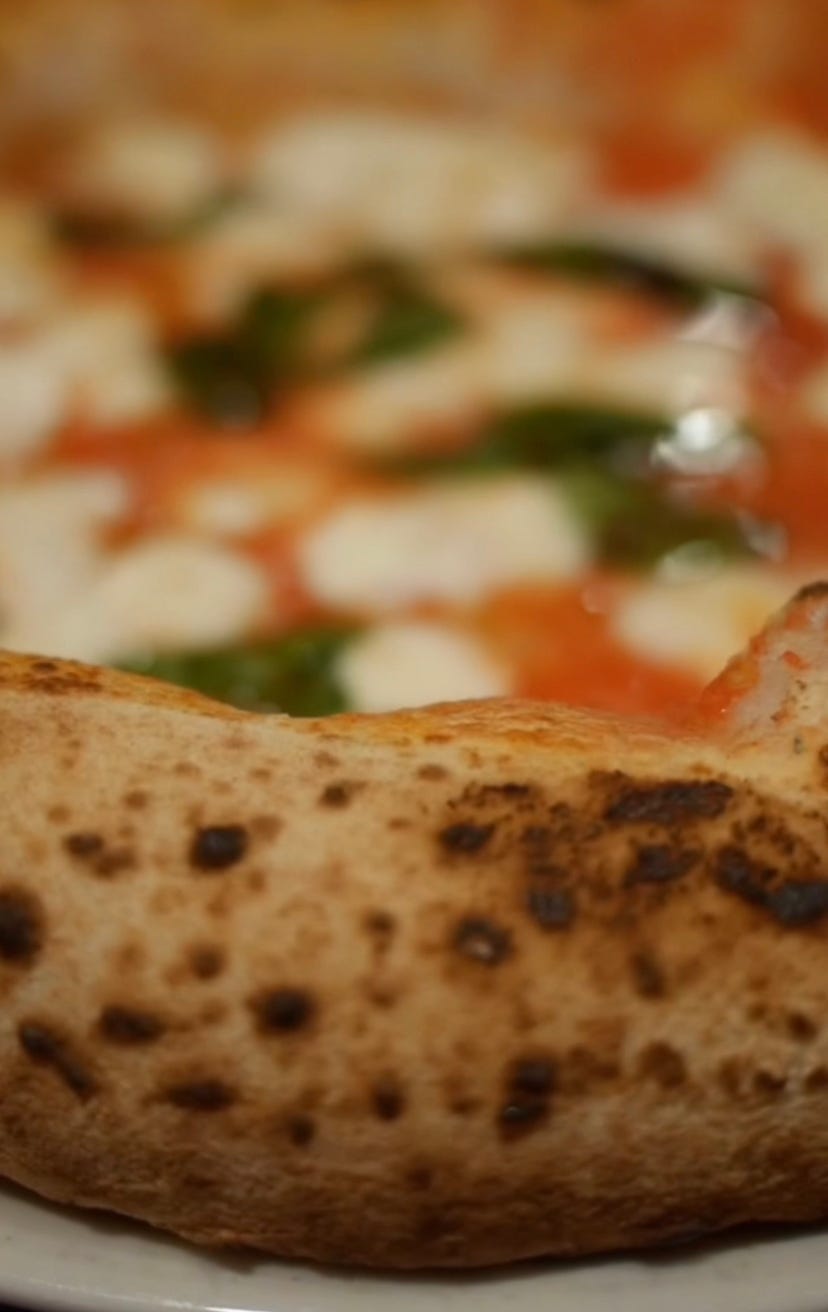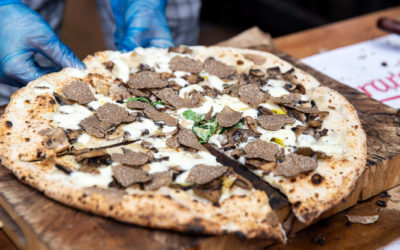Anthony Mangieri didn’t call his pizzeria Anthony’s, or even Tony’s. He named it Una Pizza Napoletana – Italian for “A Neapolitan Pizza.”
The Neapolitan immigrants who first brought pizza to New York over 100 years ago made their pies much larger, thinner and crisper than the originals back home. For the better part of a century, there was no turning back.
Not Mangieri. On family visits to Naples he cultivated a soft spot for softer pizza. The pizzeria he opened in 1996 on the Jersey shore was a beachhead for a Neapolitan pizza renaissance that wouldn’t take hold for at least a decade. He moved Una to New York’s East 12th Street in 2004 and San Francisco’s 11th Street in 2010, gaining reverence and notoriety on both coasts as a pizza fundamentalist who was fanatical about his Margherita and nearly as demanding of those lining up for it.
In 2018 Mangieri returned Una to downtown New York. Last month I caught up with him at 175 Orchard Street, curious to know if he had mellowed at 50. This interview has been edited and condensed for clarity.
How did you come up with the generic-sounding name Una Pizza Napoletana?
I remember sitting in my grandmother’s dining room. I was writing down all these names. I wanted a name that just said what it is. I didn’t want it to be my name. I wanted the name to mean something humble, but also beautiful. Some people think it means “one”, “number one” or something like that. It actually just means “A Neapolitan Pizza.” I thought it was cool to have that name.
Why did the pizza in Naples have such a profound effect on you?
When you’re a teenager, you’re looking for something so you don’t feel alone in life. When I discovered the pizza in Naples and the culture in Naples, it touched me so deeply. I found where I belonged. I found my people. I found my thing.

The irony is that back home, this connection made you an outcast. Your fellow New Jerseyans had their own way of making and eating pizza. Same when you moved to New York. Yours was a movement of one.
I didn’t have any peers in America to look up to or be inspired by when it came to Neapolitan pizza. I definitely had pizzerias that I loved in America, like Totonno’s, Lombardi’s, John’s on Bleecker Street. There were a bunch of places that I really loved, but nothing like what touched me in Naples, nothing like what I wanted to do with the rest of my life.
In the back of your mind, were you determined to be a rebel? Were you looking to create the next big thing?
It wasn’t like I wanted to do it as a concept. It’s not like Neapolitan pizza is my new concept after I had a barbecue place. My family is from that part of the world. It’s life to me. This is all I do. When I started to discover this style of cooking when I was very young and with my family in Italy, I would come back and be like, oh my God, how could no one be making this in America! It felt so ethnic and exotic. It didn’t even seem Italian to me, from what I grew up eating, which was Italian-American.
You were a tattooed hipster baker and a one-track food obsessive long before these identities became millennial archetypes. Your single-mindedness foreshadowed a generation of young food geeks who would lock themselves in a garage and not step back out into the light of day until they’d mastered the chocolate chip cookie.
I think people always did that with music, or writing, or painting. Not to say that I ever thought of myself as an artist. But I approached my work ethic with the idea of doing something like that. Most people that were in cooking would get through something and then want to get on to the next concept. Or maybe they were no longer stimulated. Maybe I’m just a dummy (laughs). I’m constantly stimulated by one thing. That’s the way I approached it. I just wanted to make this thing and make it better every day.
There’s a British expression “end of”: A person has perfected the lobster roll, the Korean chicken wing, or pizza and it’s end of story. But you weren’t the end of, were you? You were the beginning of.
What does that even mean? If you’ve achieved something, that’s the end of it? I don’t believe there’s an end to your life’s work. Otherwise, you’re dead. The journey and the constantly wanting to learn and waking up curious, I think that’s what makes life beautiful. If you really want to bring something to your community, your co-workers, your family or your friends, the only way to do that in your work is to go in with a curiosity and a humbleness and never feel that you’re the best, that there’s nowhere to go with this.
So you don’t think you’re the best? That’s not the impression you gave us in the early days of Una.
When you’re young, you don’t know what you’re doing and you’re looking for something to latch onto. Then, if you’re in it for real and it’s not bullshit, you’re gonna push and push and push and all of sudden you feel like, I’m surpassing my teachers and my inspirations so F them, I’m better than them now. You get egotistical. I’m the best. I’m great. I’m better than everybody. And you need that. That’s what gets you through life. Otherwise, you’re going get kicked in the nuts.
Then you get to a place as an adult where every day you have self-doubt. Maybe I’m full of shit. I gotta figure things out. Which is weird, because I know more now than I did then. I was 25 and I didn’t know anything. I thought I was the best. Now I’m 50 and I think I don’t know anything. There are people coming in here, they shouldn’t even be coming in. I don’t know what I’m doing.
Are you telling me Anthony Mangieri has imposter syndrome?
Don’t kid yourself, I have my ego. But I think you have to have doubts. How else can you keep learning? Honestly, if this was something I thought I had mastered, I would just close. I wouldn’t want to get up and put in any effort.
I still change the dough recipe every day. I’m trying to improve every aspect of this restaurant, every day. Last week, I was talking about this new project I was working on for a certain part of this restaurant to make it better and one of my co-workers said to me, “Man, I didn’t think you could push it any further.” Somehow, I keep finding ways to try to fine-tune it and make it better. That’s a certain way of approaching life in general.
Do you feel you’re a perfectionist, more so than an innovator?
If you understand Neapolitan cuisine and you understand the flavors and ingredients of Southern Italy, I think the innovating is subtle. I don’t think innovating means all of a sudden you go to Naples and you’re seeing a super-thin crust made with cornmeal and covered in hot dogs and french fries. I don’t think innovating means going 180 degrees the other way. It just means this is what we made today, if we do this tomorrow this way it’s better. And the next day this. And the next day this. That’s the innovating. Making those micro-adjustments to constantly make it better.
There’s a really incredible guy who I love, Richard Sachs, a bicycle frame maker in Connecticut. Incredible craftsman and artist. He was a big inspiration. One of the things he always said that I loved was “imperfection is perfection.” For me, that’s where the innovation is. That’s the pushing. That’s the journey. Going to your space every day and thinking, yesterday didn’t work well so now I will try this. Or this raw material isn’t what it used to be so I’m going to search for a better one that’s going to take what I’m trying to achieve to a higher level.
Did you find this kind of subtle innovation happening in Naples?
Over time, as I kept progressing and pushing myself, I was going back to Naples and the people of that era [the noughties] where not progressing. I felt like I was surpassing it. I felt like they didn’t care. They weren’t making those micro-adjustments to constantly make it better. It’s almost like when you go to an old restaurant that’s been around for like 50 years and the third generation is running it and you go in and you’re like, this is crap. It was like that in Naples for quite a few years.
The awesome thing is there’s been an evolution, led by a lot of younger kids like Carlo Sammarco and Salvatore Lioniello who grew up on pizza in Naples and Campania. With social media they’re more connected, more worldly. They’re more open to experiment. Before, it was, “this is the way Neapolitan pizza has to be made or it’s not Neapolitan.” Now they’re approaching it with passion, with open-mindedness. They’re trying to use the best ingredients. They’re trying to make it better. The pizza in Naples and Campania is the best it’s been in years.
Why didn’t you like it when we pizza lovers broke your rules?
When I was younger, I was more of a stickler for everything. Uh-oh, they’re sharing a pizza, it’s going to be ruined! Now I don’t care what people do. Once it leaves us, do whatever you want. You can throw it on the ground and dance on top of it. I have my opinions and I think you shouldn’t share. You just miss the whole experience of it. I love pizza slices. I love Italian-American pizza. I love Roman pizza. But if I’m in Naples, I still love to eat pizza with a knife and fork, like a steak. When you eat it that way, that’s when you experience everything – the flavors, the dough – at its highest.
On a good night, our pizza is puffy and wild and has some crazy air structure in it. If you cut it into slices as soon as at it comes out, it crushes all that beautiful work. But….(sighs)….whatever. Everyone can do whatever they want.

You’ve maybe softened, Anthony, but you’re still that maniac who insists on things being a certain way. I love your pizza and stand in awe of your commitment, but I wouldn’t want to live with you.
No, I’m actually a good roommatel. (Laughs)
But you can’t sit back and relax, can you?
I refuse to relent. You definitely cannot get the pizza that I made in Mount Pleasant (New Jersey) when I was 20. Or the pizza that I made on 12th Street (New York) when I was 28. We’re constantly trying to make our pizza better. I’m truly thankful to still be able to do this, to be at a point where we’re pushing and we’re learning and we’re trying to be better and we’re super busy. It’s just like all gratitude, man.




0 Comments